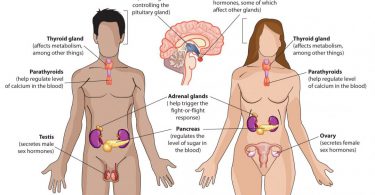Anorexia nervosa a behavior pattern involving self starvation that often arises in adolescence and is especially prevalent among girls .Anorexia is one of several eating disorder listed in DSM 111 Another closely related to anorexia is bulimia Sue wood aged 18 , has been trying to keep a secret from her family and friends ; she is a binge eater , when others are not around or after they are asleep sue wood often gorges on cake , ice cream candy and other food – so fast that there is hardly time to chew . It seems that once she has begun. It seems that once she has begun, there is no stopping until she is so stutted her stomach aches or she is so exhausted that she falls asleep .Alter! Binge sue wood is disgusted with herself for her lack of self control she feels depressed and guilty. Often she makes herself vomit, takes a double or triple dose of a laxative. To compensate for the gorging, she sometimes goes on severe fasts. Her life .she feels is almost totally dominated by her obsession with food .
Characteristics of bulimia; sue wood’s behavior, thoughts and feelings fit thee DSM111 diagnostic criteria for bulimia. The disorder is sometimes called binge purge syndrome and sue wood’s pattern certainly fits the label. Her struggle with her, urge to eat leads, over and over again, it cycles in which she stuffs food in, purges it out with vomiting laxatives, and some times goes on extreme diets. Bulimia is hard because the binging and purging are hidden ; the victim’s public eating habits are appropriate , and body shape and weight remains within normal limits .thus it is hard to know just how wide spred bulimia . But another study reported that 13 % of 355 students in a suburban college experienced all the major DSM111 diagnostics symptom of bulimia.
Discrepancies like this suggest that there may be many people like this suggest that there may be many people on college campuses who have bulimia but do not seek treatment.
Bulimia most often begins as a problem of overeating and body weight lead to radical efforts to regain control by extreme dieting or purging with in a year or so the binge-purge –diet cycle has begun . At this point the bulimic person’s life can become almost completely dominated by thoughts of food; worries about weight and feelings of depression, shame and self-control. All this can make it very hard to concentrate on school work or to meet the daily demands of a job. Social relationships may also take a beating, partly because of the extreme secrecy that shrouds the bulimic person’s life.
Causes of bulimia, we do not yet know the causes of bulimia, but researchers have been busy studying the psychological processes in bulimic people and their families. One common finding is that the family history usually includes some impulse control problems. It may be that bulimic people inherit some susceptibility to impulse control problems in their families make them specially, sensitive to concerns about self-control. These concerns come to center on food and body size, much as they do in anorexia. Like anorectic people diagnosed as having anorexia also have bulimic episodes of gorging and purging. A malor difference between the two disorders is that people with bulimia, unlike those with anaroxia, manage to keep their body weight with in normal limits – though at great psychological cost, research is now being focused on the question of why some people’s concerns about self-control, food, and body size lead to anorexia while others with similar concerns develop bulimia.
SUBSTANCE –USE DISORDERS
As we discussed earlier, social context influences people’s judgments about what behavior is abnormal or disordered. This seems especially true when it comes to the problem of substance abuse. Most societies frown on some forms of substance dependence, but different societies do not agree on which dependencies are normal and which are problems. For instance, few people in western cultures consider caffeine or tobacco dependence a serious psychological disturbance, and tobacco dependence and tobacco with drawl as disorders. On the other hand, alcohol and heroin dependence are widely considered to be serious disorders in our culture, they are also row of the most prevalent dependence – in the United States alone, they are half a million heroin addicts and over 5 million alcoholics .
ABUSE VERSUS DEPENDENCE
In describing disorders, involving alcohol, heroin and a variety of other. substances DSM111distinguishes between two levels of substance misuse ; abuse , the milder level , involves some maladaptive use pattern – remaining intoxicated through out the day , for example – and some impairment in social or job functioning . dependence a state of physical addiction, which involves tolerance – increasing amounts of the substance are needed to achieve the desired and withdrawal symptoms – when the substance use is stopped or reduced unpleasant physical symptoms and increased tolerance are signs that a real physical need has developed and that there are actual alterations in the body’s physiology, in some cases, brain impairment occurs. Addicts who are withdrawn from a drug become so agitated, depressed or other miserable that they can think of nothing but getting their next dose . in the case of alcohol dependence , withdrawal symptoms may include tremor –the shakes , delirium , convulsions , and hallucinations , without convulsions , these symptoms are collectively called delirium tremens . Note however that a number of the drug or substance habits that people form do not involve any real physical dependence. In these cases – for example, marijuana and LSD HABITS – what develops is a strong psychological need for the substance – it helps the person relieve tension or feel better in, some other way ‘this psychological need can produce a craving that for some people is as strong as physical dependence.
Searching Tags for This Article: Bulimia Nervosa Symptoms, Bulimia Nervosa Causes, Bulimia Nervosa Causes, Bulimia Nervosa Prevention, Bulimia Nervosa Diagnosis, Bulimia Nervosa Treatment with Homeopathy.





